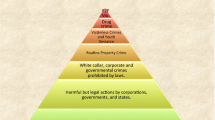Abstract
Legal literature from the beginning of the century, as well as more recent studies, furnish us with accounts of cases of innicent men and women who were tried and convicted of serious crimes throughout the United States. This study surveys the literature on those cases and describes these wrongful convictions by the distribution of offenses, of sentences, of actual punishment inflicted, and types of error contributing to the wrongful conviction.
Similar content being viewed by others
References
Borchard, E. M. (1932).Convicting the innocent: Sixty-five actual errors of criminal justice. Garden City, New Jersey: Doubleday.
Brandon, R., & Davies, C. (1973).Wrongful imprisonment: Mistaken convictions and their consequences. London: George Allen & Unwin.
Dun, W. N., & Swierczek, F. W. (1977). Planned organizational change: Toward grounded theory.Journal of Applied Behavioral Science, 13, 135–157.
Ehrmann, S. (1962). For whom the chair waits.Federal Probation, March,14–25.
Escobedo v. Illinois, 378 U.S. 478 (1964).
Frank, J. (1957).Not guilty. New York: Doubleday.
Gardner, E. S. (1952).Court of last resort, New York: William Sloane Associates.
Lofton, J. (1966).Justice and the press. Boston: Deacon Press.
Loftus, E. F. (1979).Eyewitness testimony. Cambridge, Massachusetts: Harvard University Press.
MacNamara, D. E. J. (1969). Convicting the innoncent.Crime and Delinquency, 15, 57–61.
Merton, R. K. (1957).Social theory and social structure New York: Free Press.
Miranda v. Arizona, 384 U. S. 436 (1966).
Morgan, M. (1948).The legacy of Sacco and Vanzetti. New York: Harcourt.
Packer, H. L. (1968).The limits of the criminal sanction. Stanford, California:Stanford University Press.
Radin, E. D. (1964).The innocents. New York: William Morrow.
Sheppard v. Maxwell, 384 U. S. 333 (1966).
Author information
Authors and Affiliations
About this article
Cite this article
Rattner, A. Convicted but innocent. Law Hum Behav 12, 283–293 (1988). https://doi.org/10.1007/BF01044385
Issue Date:
DOI: https://doi.org/10.1007/BF01044385




